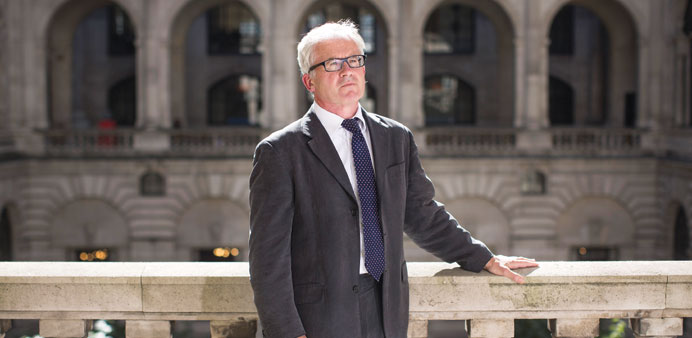David Miles, monetary policy committee member at the Bank of England, poses for a photograph following an interview at the BoE in London. Miles says rates increases from the current record low of 0.5% will happen “pretty gradually” and the normal level of rates will be around 2.5% to 3%.
Deutsche Bank tackles debt-trading unit as Cryan seeks cost cuts
Bloomberg, Reuters/London
Bank of England policy maker David Miles said interest-rate increases are on the way and will be a reflection of the economy’s strength.
The turning point for borrowing costs is coming “pretty soon,” he said in a BBC interview broadcast on Tuesday. “It’s taken a long time to get there, and we’re not fully there yet.”
Miles, who leaves his role on the rate-setting committee at the end of the month, said increases from the current record low of 0.5% will happen “pretty gradually” and the normal level of rates will be around 2.5% to 3%. He also said the first move should be taken as sign that the economy is returning to a “more normal position,” rather than anything to worry about.
“What we’ve seen in the last few years is thankfully a recovery in consumer spending, but not runaway consumer spending,” Miles said. “People have not been borrowing very much. We’ve got back to normal growth rates, but I don’t think it’s on the back of a boom in consumer spending simply driven by the housing market.”
While inflation is still well below the central bank’s 2% target, some officials say the headline measure may hide underlying price pressures. Miles’s comments chime with those from policy maker Kristin Forbes, who said this week Britain is enjoying a “solid recovery” and that delaying an increase may mean more aggressive tightening later.
The pound reached a seven-week high against the dollar on Tuesday after data showed a core measure of inflation accelerated to 1.2% in July, the fastest in five months. The headline rate was at 0.1%, up from zero in June.
The benchmark interest rate has been at 0.5% for more than six years. Forward contracts based on the sterling overnight index average, or Sonia, signal a 25 basis-point increase next July, compared with August 2016 on Monday.
“Because the path of inflation will itself probably be gradual, I think the path of interest rates will also probably be gradual,” Miles told the BBC. Unlike occasions in the past, when the BoE had to increase rates because inflation was at risk of “getting out of control,” that’s not happening now, he said.
Meanwhile, around half of British households expect the Bank of England to hike interest rates in the next six months, up sharply since July even though they have become more downbeat about their finances, a survey showed yesterday.
Markit’s monthly Household Finance Index showed 48% of households predict the BoE will raise interest rates over the next six months, the highest figure since July 2014 and up from 34% last month.
Economists polled by Reuters expect a first interest hike early next year as Britain’s economy shows little sign of slowing much.
However, households were the gloomiest about their finances so far in 2015, across a majority of job sectors. They were slightly less downbeat about the prospects over the next 12 months than they were in July.
Data company Markit said the survey suggested the boost in consumer morale from falling inflation has started to ease off.
“Improving economic fundamentals and gradually rising income from employment should continue to support household finances through the remainder of this year,” said Tim Moore, senior economist at Markit.
“But the ongoing strains reported in August highlight an underlying fragility around the edges of the recovery.”

